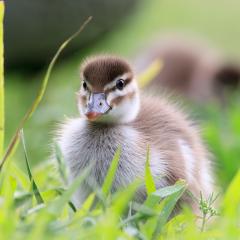Compost is the single most important supplement you can give your garden. It’s a simple way to add nutrient-rich humus to your lawn or garden that fuels plant growth and restores vitality to depleted soil. It's also free, easy to make, and good for the environment. This week during Compost Awareness Week, we are highlighting some of the great composting-related initiatives around our campuses.
Georgia Franklin is President of UQ’s Community Garden Club. UQ has two community gardens: UQ St Lucia and UQ Gatton.
With the garden currently closed due to COVID19 social distancing, Georgia is almost single-handedly keeping the garden going. It is such a delightful space. 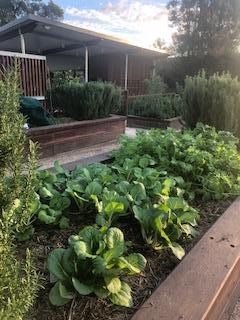
When it is open, the garden hosts groups from the on-campus kindergartens and rehabilitation patients from UQ’s allied health programs.
The UQ Sustainability Team dropped in to see how the UQ St Lucia Community Garden deals with compost.
Why is composting important?
Approximately 50% of the rubbish Australians put in the everyday mixed-waste ‘garbage bin’ could be put to better use in the garden as compost. About 33% of the rubbish is food organics (including peelings) and about 10% is garden vegetation. When this organically active material buried ‘anaerobically’ (without air) in landfills, it contributes over 3% of Australia’s total greenhouse gas emissions annually through the production of methane gas, which has 25 times the global warming potential of carbon dioxide.
By using it as compost instead not only directly sequesters carbon in the soil, using compost on land reduces the need for water by an average of 30%, greatly improves soil quality and helps grow beautiful vegetables and fruit.
What sort of composting system have you put in place in the Community Garden?
We have three bins, which we rotate. Once a bin is full, it will sit for a couple of weeks and then we will transfer that into 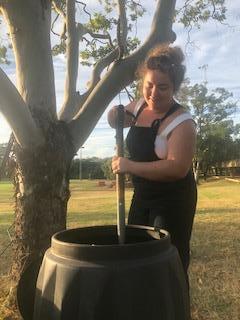
the compost bay, where it will sit and mature for about four months and after that it can go into the garden beds. It is a bit of a
process.
But the biggest thing for us is making sure that we have constant ‘feed’ in the bins.
Where do you get your compost ‘feed’ from?
Lots of residents who live close to campus collect their organic waste from their kitchen and then ‘take their bin for a walk’ and deposit it in the composting bins in the garden. This means these organic scraps are avoiding landfill and helping to reduce carbon pollution, as well as building healthier soils in the Community Garden. However, although the garden itself is closed, you can still drop your compost waste into the bins that are located just outside the fence behind the garden.
When the campus reopens again, we are also looking at trying to collect coffee grounds and organic waste from some of the cafes on campus.
Do you use any of the organic waste from the organics collections on campus?
No. The organics waste collection on campus is taken offsite to a specialist sorting facility.
What if I don’t live close to campus? Do you have any tips about what I can do with my organic waste?
Brisbane City Council has Community Composting Hubs across the city where you can take your organic waste, although, unfortunately at the moment they are all closed. However the Council has composting at home tips you might like to try until the hubs open again.
Is there anything that can’t go in an organics waste collection?
Do not add the following ingredients to compost: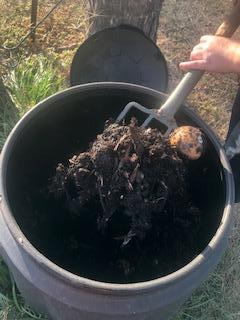
- citrus
- dairy products
- manure from carnivores (e.g. cats and dogs)
- meat scraps
- plants that are diseased or have been sprayed with pesticides
- plastic
- treated timber
- vegetable fats and oils
- weeds.
How could I make my own compost at home?
You don’t need fancy equipment. If you have an old plastic garbage bin, put some holes in the bottom so the compost will get air. Sit the bin on a pallet or on some bricks. Then you can just use it just like one of our compost bins. My flatmates and I use a bin like this to collect the organic waste from our kitchen.
Then try to keep a 3:1 ratio with feed and carbon. So for every amount of nitrogen (vege scraps or lawn clippings) that go into your compost bins, we add three times that amount of carbon, which is any kind of dried material (cardboard, old dried leaves, newspaper, bark). Then, if the compost is looking a bit dry, we top it up water. You can also add a bit of garden lime (which you can get at a nursery or hardware store) to your compost to prevent maggots.
There are so many gardeners who have put their thoughts and ideas on composting on YouTube. It is a terrific resource. Try Costa Georgiadis’s Guide to Household Composting or if you are feeling the suffocated by too many rules at the moment, try the No Rules Compost video.
You can even add worms into your compost and you can collect the worm ‘tea’, which acts as a fertiliser to enhance your soil and plants even more.
Does the Community Garden have its own worm farm?
Yes, we do. We started off with only about 100 worms. Some people start off with 1,000, but it really depends on your space. We feed them probably about once 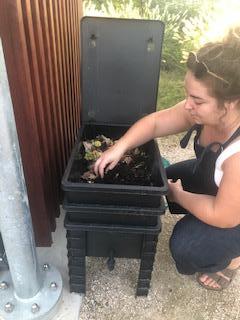
a fortnight. We move the food from corner to corner so that the worms are not constantly inundated with food and that they can breathe in some of the space.
You know that your worm farm is doing well when the castings are quite ‘clumpy’. It means that the worms are feeding really well. Every two months we collect
the worm tea, so it does take quite a bit of time. It slows down in winter when there is not as much humidity.
Have a go at making your own worm farm.
Thanks so much, Georgia. It was great to hang out in your space and learn a bit more about what you are doing in the UQ Community Garden.
Make sure that you follow the UQ Community Garden or for more information contact them uqcommunitygardenclub@gmail.com. The Community Garden will
look at reopening when restrictions on groups of people gathering are lifted.
Resources and free stuff
Free workshops
If you are interested in learning more about composting and worm farms, Brisbane City Council run free workshops. Keep your eye out for them when restrictions are lifted.
Discounted compost bins and worm farms
After attending one of these workshops, you will receive a voucher to buy a compost bin and compost aerator or a worm farm and worm farm conditioner at a discounted price when purchased at Council’s tip shops. The initiative will make setting up your organic recycling system at home more affordable. Purchasing a compost bin or worm farm at Council’s tip shops also supports the Endeavour Foundation, who run Council’s Tip Shops and support people with a disability.The Endeavour Foundation will receive a $5.50 donation for each compost bin sold, $6 for each worm farm sold, $2 for every compost aerator sold and $3 for every bottle of worm farm conditioner sold using a voucher.



